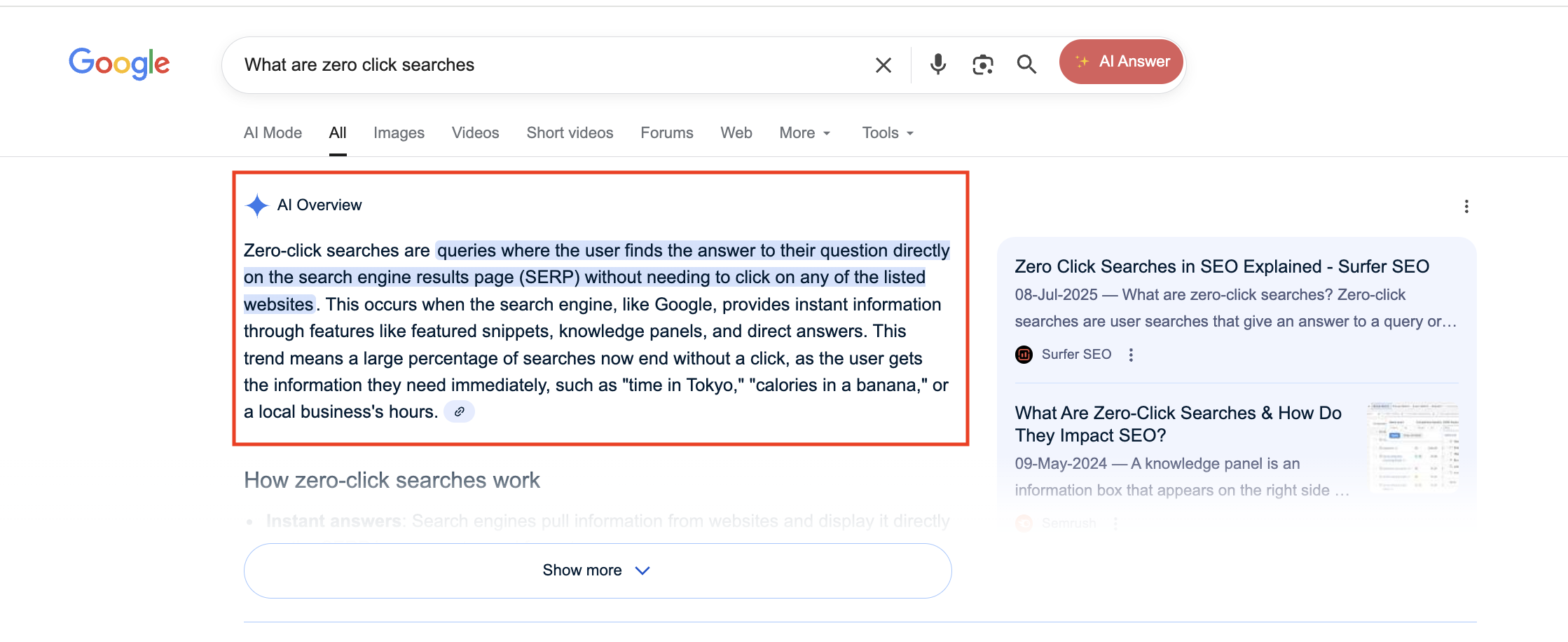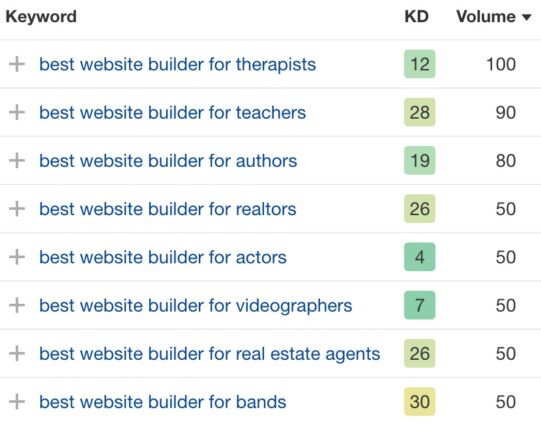
Zero-click searches give answers right on the search page.
They show information directly without needing to visit another website. For example, when you Google something and see the answer at the top of the page, that is a zero-click result – assuming you don’t click anything else. These searches are supported by features like featured snippets, knowledge panels, and AI-generated overviews that provide instant answers.
Since users no longer need to visit external sites for quick facts, zero-click searches have changed how SEO works. Businesses need to optimize their content to appear in these top positions, ensuring their information reaches audiences even if clicks decrease. With nearly 60 percent of Google searches ending without a click (Search Engine Land, 2024), understanding zero-click searches has become essential for staying visible and relevant in modern search results.
What Can You Do?
Optimize for Featured Snippets
Featured snippets are the highlighted boxes at the top of Google’s search results that give users quick answers to their questions. To earn this prime spot, structure your content clearly and make it easy for search engines to understand. Use headings that ask common questions and follow them with short, natural answers that summarize key points.
Breaking your content into smaller sections, using bullet points, numbered lists, and simple tables can help Google identify important details quickly. The goal is to make your information both accurate and easy to scan so Google sees it as the best match for instant answers. When done well, this not only boosts your visibility but also builds authority and trust in your niche.
Focus on Long-Tail and Conversational Keywords
Search behavior has become much more conversational with the rise of voice assistants and AI-driven tools. Users no longer type short, vague phrases; they ask full questions like “how can I grow my business online” or “what are the best SEO tools for beginners.” (Writesonic, 2025) To reach these users, include long-tail keywords that sound natural and match how people actually speak.
These keywords face less competition and often attract more relevant traffic. Incorporate them naturally into your headings, FAQs, and main content to increase your chances of appearing in voice searches, AI summaries, and featured results. This approach not only improves ranking but also helps your content align with real user intent.

Strengthen Your Brand Presence
In the age of zero-click searches, brand trust and recognition matter more than ever. Building a strong brand recognition is essential to maintaining visibility and trust. Consistent messaging across your website, social media, and other digital platforms helps users recognize your brand instantly.
Sharing valuable, insightful content positions your business as a reliable authority in its field. Encourage satisfied customers to leave reviews, earn mentions on other trusted sites, and form partnerships that boost credibility. The stronger and more visible your brand becomes, the more likely users are to choose you when they’re ready to engage or make a purchase.
Use Schema Markup to Enhance Search Visibility
Schema markup is a special code added to your website that helps search engines understand your content better. It’s one of the most effective technical tools for improving visibility in rich search results such as FAQs, ratings, how-to steps, and knowledge panels.
When your pages are structured with schema, Google can easily pull key information and display it in enhanced formats that catch attention, often without requiring a click. These results not only stand out visually but also signal authority and relevance. Implementing schema markup takes some setup, but it can significantly increase your site’s reach and performance in the age of zero-click searches.
Create Content That Builds Trust and Value
Finally, adapt your content strategy to focus on delivering real value instead of just chasing clicks. In today’s zero-click world, users want quick and reliable answers, and brands that offer genuine help stand out.
Create blog posts, guides, and videos that educate, inspire, and solve real problems while showing expertise, experience, authority, and trustworthiness, what Google calls E-E-A-T. Use clear explanations, credible data, and expert insights to make your content both useful and trustworthy. When people consistently find value in what you share, they begin to see your brand as a reliable source, building lasting trust and loyalty even if they don’t click right away.
Track Visibility and Engagement, Not Just Clicks
With more searches ending without a click, focusing only on traditional metrics like traffic or conversions no longer gives a full picture of SEO success. Instead, measure how often your content appears in search results, how users engage with it, and how your brand is perceived.
Tools like Google Search Console, SEMrush, and Ahrefs can show impressions, average positions, and keyword coverage, all of which reveal your visibility even when clicks don’t occur. Tracking engagement metrics such as time on page, shares, and brand mentions also helps you understand how users interact with your content across platforms. A broader, engagement-focused approach ensures your SEO strategy remains effective in a world where visibility is just as important as clicks.

Conclusion and Final Thoughts
The rise of zero-click searches has changed how SEO works. It’s shifting the focus from clicks to visibility and trust. Businesses that optimize for featured snippets, knowledge panels, and AI overviews can stay visible even when users don’t leave the search page. Creating valuable, easy-to-understand content that directly answers user questions is now key to building authority and recognition.
Struggling to keep up with SEO changes? At Search Pros, we specialize in AI-powered marketing that helps brands thrive in the age of zero-click search. From smarter content optimization to data-driven visibility strategies, we help you stay ahead.
Get in touch with Search Pros today to take your SEO to the next level in the age of zero-click search.
